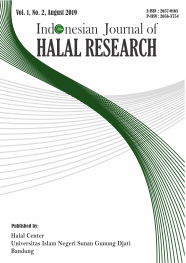Study of Critical Point Analysis on Meat-Based Foods in Bandung
DOI:
https://doi.org/10.15575/ijhar.v1i2.5780Keywords:
critical control, halal, meat-base food, snacks, tayyib.Abstract
Halal is a term of lawful or permitted to do according to Islamic law which regulates all aspects of life especially in consuming food. Halal critical point is a condition of food processing. Halal food has a possibility transformed into haram if there are non-halal ingredients used during the food processing. The concept of Halalan Tayyiban is not widely understood by the Muslim, although it is necessary for all human according to health and hygiene. This research was a descriptive study with a qualitative approach. The interview and observation to 8 informants were carried out to the seller of sausages (chicken and beef), cilok, burger, bump and three types of meatballs. The results of the halal condition analysis of processed meat-based foods which is supported by the results of observations and interviews directly pursed into two main important discussions, namely in terms of the composition and processing of processed meat-based food.
References
Charity, M. L. (2017). Jaminan Produk Halal di Indonesia (Halal Products Guarantee in Indonesia). Jurnal Legislasi Indonesia, 14(1), 99-108.
Dahlan, A. A. (1996). Ensiklopedi Hukum Islam. Jakarta Pusat: Ikhtiar Baru Van Hoeve.
Denyingyhot, A., Phraephaisarn, C., Vesaratchavest, M., Dahlan, W. & Keeratipibul, S. (2017). Simultaneous Detection of Three Forbidden Animals (Porcine, Canine and Rat) In Halal Food by Using High Resolution Melting Analysis. Scientific Bulletin. Series F. Biotechnologies, XXI, 284-288.
Fibriana, F., Widianti, T., Retnoningsih, A., dan Susanti. 2012. Deteksi Daging Babi Pada Produk Bakso di Pusat Kota Salatiga menggunakan Teknik Polymerase Chain Reaction. Biosaintifika. 4(2).
Kulsum, Y., Adawiyah, A., Shofwaturohmani, F. & Nurjanah, D. (2018). Pig Sample Handling in Laboratory Scale. Indonesian Journal of Halal Research, 1(1), 14-17
Majelis Ulama Indonesia. (2010). Halaman 17
Masthu, H. (1995). Makanan Indonesia dalam Pandangan Islam. Kantor Menteri Negara Urusan Pangan Republik Indonesia. halaman. 55-106
Nakyinsige, K., Man, Y. B. C., Sazili, A Q., Zulkifli, I. & Fatimah, A. B. (2012). Halal Meat: A Niche Product in the Food Market. In 2012 2nd International Conference on Economics, Trade and Development IPEDR vol. 36 (2012) © (2012) IACSIT Press, Singapore Halal (Vol. 36, pp. 167-173).
Nurlaela. E. (2011). Keamanan Pangan dan Perilaku Penjamah Makanan di Instalasi Gizi Rumah Sakit. Media Gizi Masyarakat Indonesia, 1(1), 1-7
Sani, A. (2017). Metode Penetapan Standarisasi Produk Makanan Halal (Studi Perbandingan Majelis Permusyawaratan Ulama Aceh Dan Majelis Agama Islam Patani). Skripsi. Fakultas Syari-ah Dan Hukum Prodi Perbandingan Mazhab Universitas Islam Negeri Ar-Raniry Darussalam - Banda Aceh
Sukiati. (2013). Konsep Halal dan Haram dalam Al-Quran Kajian Hukum Islam dengan Pendekatan Tafsir. Doctoral Thesis. Pascasarjana UIN-SU
Syafrida. (2017). Sertikat Halal Pada Produk dan Minuman Memberi Perlindungan dan Kepastian Hukum Hak-Hak Konsumen Muslim. Adil: Jurnal Hukum, 7(2), 159-174.
U.S. Commission on International Religious Freedom. (2017). Annual Report. WWW.Uscirf.Gov @Uscirf
Waharini, F. M. & Purwantini, A. H. (2018). Model Pengembangan Industri Halal Food di Indonesia. Muqtasid: Jurnal Ekonomi dan Perbankan Syariah, 9(1), 1-13.
Winarsih, Nihayati, K. dan Khoiriyah, R., A. 2017. Deteksi Fragmen Dna Rendah Pengkode Gen Sitokrom B (Cyt B) Babi Pada Sampel Mie Instan Menggunakan Metode Polymerase Chain Reaction (PCR). Biotropic The Journal of Tropical Biology. 1(1).
Downloads
Published
How to Cite
Issue
Section
Citation Check
License
Copyright (c) 2019 Indonesian Journal of Halal Research

This work is licensed under a Creative Commons Attribution-ShareAlike 4.0 International License.
Authors who publish in Indonesian Journal of Halal Research agree to the following terms:
- Authors retain copyright and grant the journal right of first publication with the work simultaneously licensed under a Creative Commons Attribution-ShareAlike 4.0 International (CC BY-SA 4.0) License that allows others to share the work with an acknowledgment of the work's authorship and initial publication in this journal.
- Authors are able to enter into separate, additional contractual arrangements for the non-exclusive distribution of the journal's published version of the work (e.g., post it to an institutional repository or publish it in a book), with an acknowledgment of its initial publication in this journal.
- Authors are permitted and encouraged to post their work online (e.g., in institutional repositories or on their website) prior to and during the submission process, as it can lead to productive exchanges, as well as earlier and greater citation of published work (See The Effect of Open Access).

Indonesian Journal of Halal Research by Halal Center UIN Sunan Gunung Djati Bandung is licensed under a Creative Commons Attribution-ShareAlike 4.0 International License.
Based on a work at https://journal.uinsgd.ac.id/index.php/ijhar.

















